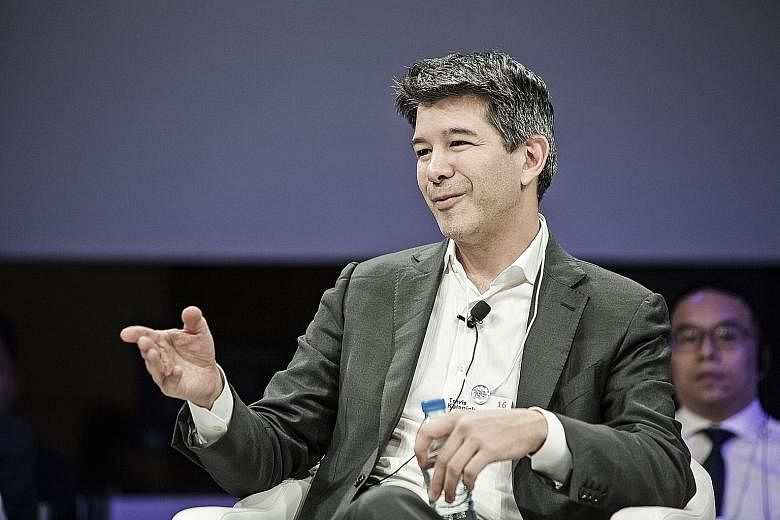NEW YORK • Mr Travis Kalanick, the co-founder of Uber, has severed his remaining ties with the ride-services company, resigning from the board and selling all his shares as he turns his focus to a new venture creating "ghost kitchens" for food delivery services.
Mr Kalanick, who helped found Uber in 2009 and once exerted nearly complete control, stepped down as chief executive in June 2017 under pressure from investors after a string of setbacks.
He will depart Uber's board of directors by the end of the year, the company said on Tuesday.
A spokesman on Tuesday said Mr Kalanick has sold his entire stake of roughly US$3 billion (S$4.1 billion) worth of shares in Uber, adding that the final regulatory form would be filed the day after Christmas.
Mr Kalanick's bellicose style turned Uber into the world's largest ride-services company, revolutionised the taxi industry and challenged transportation regulations worldwide.
"Very few entrepreneurs have built something as profound as Travis Kalanick did with Uber," Uber chief executive Dara Khosrowshahi said in a statement, crediting Mr Kalanick's "vision and tenacity".
But his brashness was also blamed for a string of scandals and complaints over his leadership, resulting in a shareholder revolt to push him out.
Mr Kalanick, 43, said in a statement: "Uber has been a part of my life for the past 10 years. At the close of the decade, and with the company now public, it seems like the right moment for me to focus on my current business and philanthropic pursuits."
He is currently working on a start-up that aims to build large industrial kitchens and lease space to restaurants. The "ghost kitchens" would prepare meals for food delivery. The company, known as CloudKitchens, to date has collected US$400 million in investor funding by Saudi Arabia's Public Investment Fund, according to Crunchbase. Mr Kalanick himself invested "several hundred million" in the business, his spokesman said, declining to provide the full amount.
Uber, based in San Francisco, transformed the way people get around and how they make a living, turbocharging the gig economy and undermining the taxi industry.
Its nearly four million drivers around the globe have logged 15 billion trips since 2010. Mr Kalanick and co-founder Garrett Camp came up with the idea of hailing a ride from a smartphone after a trip to Paris when they could not get a taxi.
Uber stock has dropped more than 30 per cent since the loss-making firm went public in May as investors grow sceptical over the ride-hailing company's business model and its ability to turn a profit.
The counter on Tuesday closed largely unchanged at US$30.44, before the Christmas break.
Analysts at Wedbush on Tuesday welcomed the news of Mr Kalanick's departure from Uber, saying it would have been a distraction for him to remain on the board.
"Many investors will be glad to see this dark chapter in the rear-view mirror," Wedbush analysts Ygal Arounian and Daniel Ives said in a note.
When Mr Kalanick resigned in the summer of 2017, the company had been through a bruising six months during which employees accused the former CEO of fostering a toxic work culture that encouraged sexual harassment and bullying.
Mr Kalanick in a statement at the time said Uber was seeking to be a workplace for everyone with no tolerance for sexual harassment and bullying, and vowed to fire staff who engaged in such behaviour.
The problems went beyond employee relations. Uber also gained a reputation under Mr Kalanick for running roughshod over regulators, launching in markets before officials were able to draft rules and regulations to keep the ride-hailing business in check.
Mr Kalanick gave up voting control of the company in October 2017 when Uber's board of directors adopted a series of measures to shore up corporate governance, including a one vote per share policy.
REUTERS, ASSOCIATED PRESS

